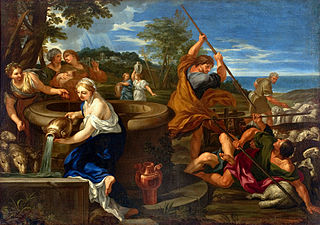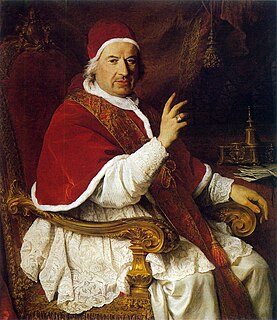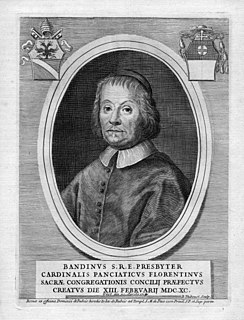
Pietro Alessandro Gaspare Scarlatti was an Italian Baroque composer, known especially for his operas and chamber cantatas. He is considered the most important representative of the Neapolitan school of opera. He was the father of two other composers, Domenico Scarlatti and Pietro Filippo Scarlatti.

Arcangelo Corelli (, also, , Italian: [arˈkandʒelo koˈrɛlli]; was an Italian violinist and composer of the Baroque era. His music was key in the development of the modern genres of sonata and concerto, in establishing the preeminence of the violin, and as the first coalescing of modern tonality and functional harmony.

Giuseppe Ottavio Pitoni was an Italian organist and composer. He became one of the leading musicians in Rome during the late Baroque era, the first half of the 18th century.

Bernardo Pasquini was an Italian composer of operas, oratorios, cantatas and keyboard music. A renowned virtuoso keyboard player in his day, he was one of the most important Italian composers for harpsichord between Girolamo Frescobaldi and Domenico Scarlatti, having also made substantial contributions to the opera and oratorio.

Ciro Ferri was an Italian Baroque sculptor and painter, the chief pupil and successor of Pietro da Cortona.

Pietro Ottoboni was an Italian cardinal and grandnephew of Pope Alexander VIII, who was also born Pietro Ottoboni. He is remembered especially as a great patron of music and art. Ottoboni was the last person to hold the curial office of Cardinal-nephew, which was abolished by Alexander's successor, Pope Innocent XII, in 1692. Ottoboni '"loved pomp, prodigality, and sensual pleasure, but was in the same time kind, ready to serve and charitable".

Francesco Barberini was an Italian Catholic Cardinal. The nephew of Pope Urban VIII, he benefited immensely from the nepotism practiced by his uncle. He was given various roles within the Vatican administration but his personal cultural interests, particularly in literature and the arts, meant that he became a highly significant patron. His secretary was the antiquarian Cassiano dal Pozzo who was also a discerning patron of the arts. Francesco was the elder brother of Cardinal Antonio Barberini and Taddeo Barberini who became Prince of Palestrina.

Benedetto Pamphili was an Italian cardinal, patron of the arts and librettist for many composers.
Alessandro Melani was an Italian composer and the brother of composer Jacopo Melani, and castrato singer Atto Melani. Along with Bernardo Pasquini and Alessandro Scarlatti, he was one of the leading composers active in Rome during the 17th century. He is also ranked among the second school of Roman opera composers which began with his brother's 1668 opera Il Girello. He is chiefly remembered today for his large output of liturgical music that he wrote while serving in various musical posts in Rome. Of particular interest is the large number of polychoral motets that he produced and his eight ascribed oratorios. Three published collections of his liturgical music survive today along with numerous solitary motets from other published volumes. A number of original manuscripts also survive.

Pope Clement IX created 12 cardinals in three consistories:

The 1689 papal conclave was convened after the death of Pope Innocent XI. It led to the election of Pietro Vito Ottoboni as Pope Alexander VIII. The conclave saw previous factions join together because they lacked numerical strength, and saw the rise of the zelanti as a political force in the election of the next pope. Ottoboni was eventually unanimously elected with the consent of the secular monarchs, becoming the first Venetian in over 200 years to be elected pope.

Francesco Maidalchini was an Italian Cardinal of the Roman Catholic Church.

The 1740 papal conclave, convoked after the death of Pope Clement XII on 6 February 1740, was one of the longest conclaves since the 13th century.

Bandino Panciatici as a Roman Catholic cardinal from 1690 to 1718.

Andrea Basili, was an Italian composer and music theorist. He was father of Francesco Basili.

The Teatro Capranica is a theatre situated at 101 Piazza Capranica in the Colonna district of Rome. Originally constructed in 1679 by the Capranica family and housed in the early Renaissance Palazzo Capranica, it was the second public theatre to open in Rome. It was the site of many premieres of Baroque operas including Caldara's Tito e Berenice, Scarlatti's Griselda, and Vivaldi's Ercole su'l Termodonte. The Capranica ceased operating as a full-scale theatre and opera house in 1881 and in 1922 was converted into a cinema. Following the closure of the cinema in 2000, it has functioned on a hire basis as a conference and performance venue.

Carlo Francesco Cesarini, was an Italian composer born in San Martino al Cimino near Viterbo and active in Rome from 1690. In 1690 he entered into the service of Cardinal Benedetto Pamphili as the director of his music academy and remained in his service until the cardinal's death in 1730. Cesarini also served as the maestro di cappella in the Chiesa del Gesù from 1704 until 31 August 1741. He composed numerous oratorios and cantatas and was the joint composer of several operas. The opera Clearco in Negroponte which he composed with Giovanni Lorenzo Lulier and Tommaso Bernardo Gaffi inaugurated the public opening of the Teatro Capranica on 18 January 1695.
He also set to music many oratorios on Benedetto Pamphilj's texts: San Vincislao (1704), Il figliol prodigo (1707), Oratorio per l'Assunzione della beatissima Vergine (1713), e Il trionfo del Tempo nella Bellezza ravveduta (1725).
The last known records of him date from early September 1741 and document his retirement as the maestro di cappella of the Chiesa del Gesù due to ill health.
Antonio Maria Montanari was an Italian violinist and composer of the Baroque period.

Gaspare Carpegna was an Italian Catholic Cardinal.
Giovanni Filippo Apolloni was an Italian poet and librettist. Born in Arezzo, he has sometimes been referred to as "Giovanni Apollonio Apolloni", but the second given name is spurious. He served as the court poet to Ferdinand Charles, Archduke of Austria at Innsbruck form 1653 until 1659. On his return to Italy he entered the service of Cardinal Volumnio Bandinelli. After Bandinelli's death in 1667 Appolloni was in the service of the Chigi family in Rome and Siena for the rest of his life. He wrote the librettos for a number of operas, the most well-known of which were Antonio Cesti's L'Argia and La Dori, as well as several oratorios and the texts for cantatas by both Cesti and Alessandro Stradella.

















